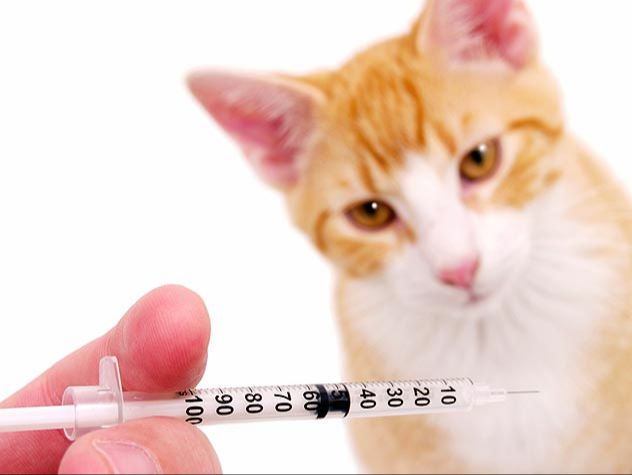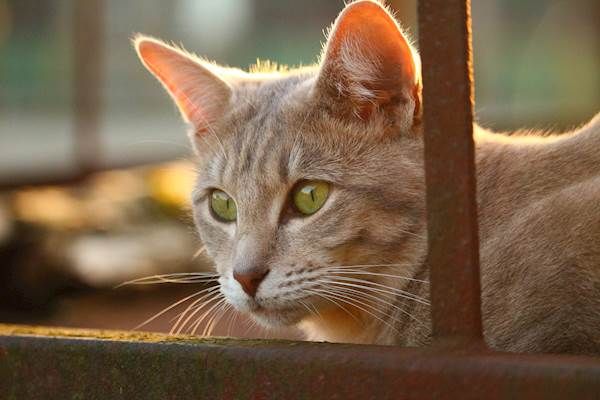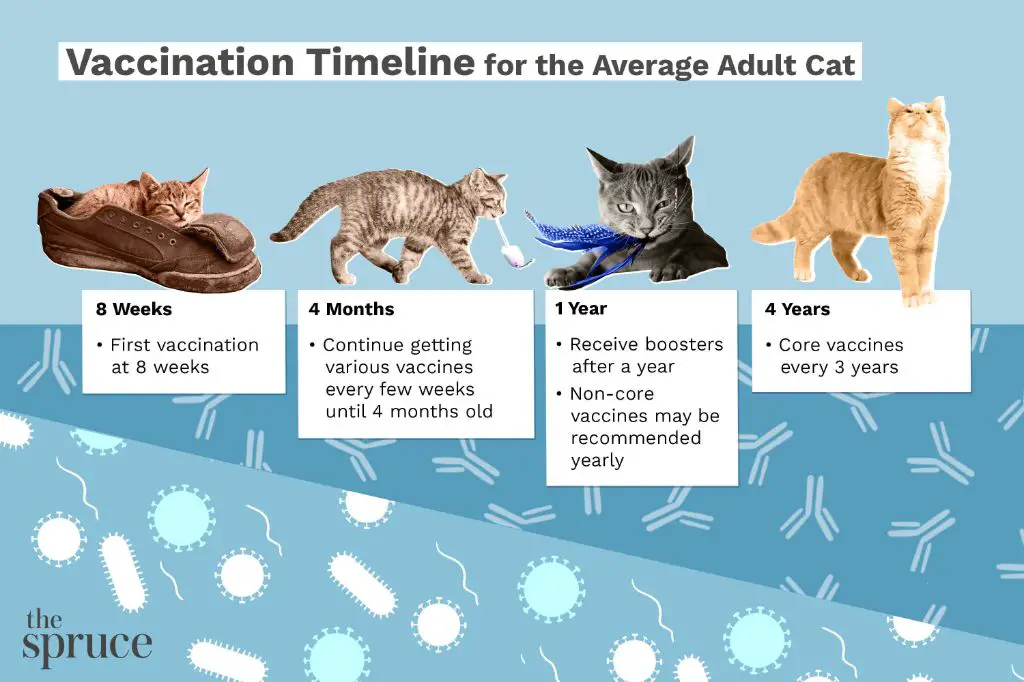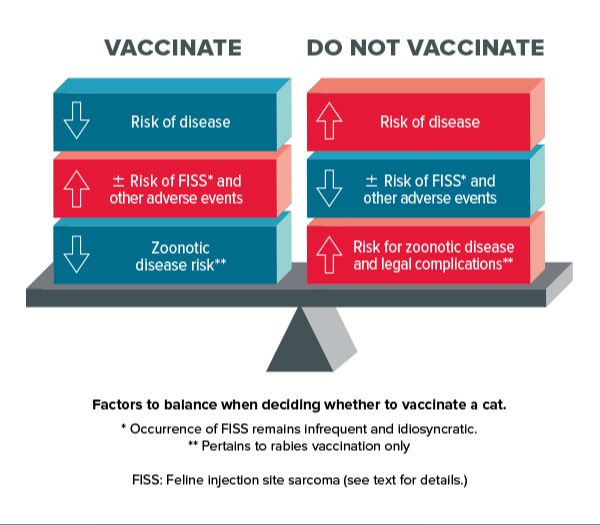Cat vaccinations are injections given to cats that expose their immune system to a small, harmless amount of disease-causing organisms or viruses. This allows the cat’s immune system to build up antibodies and develop immunity against these disease-causing agents before the cat encounters them in their full-strength form (1).
Some of the most important diseases in cats that are preventable with vaccinations include panleukopenia, feline leukemia, rabies, feline calicivirus, feline herpesvirus, and feline immunodeficiency virus. Vaccinating cats against these deadly and often fatal diseases is crucial for protecting their health and longevity (2).
Without proper vaccination, these viruses and diseases can lead to severe illness in cats involving symptoms like vomiting, diarrhea, fever, neurological issues, cancer, and sometimes death. However, by administering vaccines, veterinarians aim to prepare a cat’s immune system to fight off infection and prevent disease, ultimately saving lives (3).
Common Vaccines for Cats
There are two main types of vaccines for cats – core and non-core. Core vaccines are considered essential for all cats and protect against common and serious illnesses. According to the American Association of Feline Practitioners, core vaccines for cats include: Rabies, Feline Panleukopenia (also called Feline Distemper), Feline Rhinotracheitis, and Feline Calicivirus. These vaccines help protect cats against dangerous illnesses like rabies and panleukopenia that are often fatal if contracted. Rhinotracheitis and calicivirus cause upper respiratory infections in cats. While not always fatal, they can lead to chronic upper respiratory issues if unvaccinated. For these reasons, the core vaccines are strongly recommended by veterinarians for all cats, regardless of lifestyle and risk factors.
Possible Side Effects
While most cats tolerate vaccinations well, some cats may experience mild side effects (https://www.clarkroadanimalclinic.com/services/cats/cat-vaccinations). The most common side effects from cat vaccinations include:

- Localized pain, tenderness or swelling at the injection site
- Low-grade fever
- Lethargy or decreased appetite
These effects are usually mild and resolve within 24-48 hours. More serious vaccine reactions are very rare in cats. Contact your veterinarian if side effects last more than 48 hours or seem severe.
Rare Serious Reactions
While most cats tolerate vaccinations without any issues, in very rare cases vaccinations can trigger dangerous reactions such as anaphylaxis or immune-mediated diseases.
Anaphylaxis is a severe and potentially life-threatening allergic reaction that can occur within minutes to hours after vaccination. Symptoms include facial swelling, hives, vomiting, diarrhea, difficulty breathing, collapse, and even death in extreme cases. Thankfully, anaphylactic reactions are very rare, occurring in less than 1 in 10,000 vaccinated cats according to some estimates.1

In also exceptionally rare cases, vaccines may trigger or exacerbate immune-mediated diseases such as autoimmune hemolytic anemia, autoimmune thrombocytopenia, or autoimmune arthritis in genetically predisposed cats. These diseases involve the cat’s immune system attacking its own red blood cells, platelets, or joints respectively. However, the risks appear very small compared to the protective benefits vaccines provide against infectious diseases.1
While scary, these ultra-rare reactions need to be weighed appropriately against the much more common threats of infectious diseases that routine vaccination helps prevent. Discuss any specific concerns with your veterinarian.
Balancing Risks and Benefits
While there can be side effects from cat vaccines, the risks are low and the benefits are high. According to the AAHA, “Vaccines are considered the foundation of preventive health care programs for cats” (The Irreverent Vet Speaks out on “Are Cat Vaccines Safe?”). Vaccinating cats greatly reduces their risk of contracting serious and potentially fatal illnesses like panleukopenia, calicivirus, herpesvirus, rabies, and more. The American Association of Feline Practitioners (AAFP) states that “Vaccination has clearly been proven to be an efficacious method of disease prevention” (Cat Vaccination Guide: Benefits, Schedule, and Safety).
While some side effects like lethargy and mild fever can occur after vaccination, these are usually mild and temporary, lasting only a day or two. Serious adverse reactions are very rare. According to one source, “In many cases, the risks associated with overwhelming vaccine-preventable disease far outweigh the small risk of a vaccine reaction in a pet” (Cat Vaccinations). For healthy cats, the benefits of protection against potentially fatal diseases generally outweigh the small risk of a mild vaccine reaction. However, those risks should always be discussed with a vet.
Proper Administration
Veterinarians are the only ones who should be administering vaccinations to cats. They have the proper training and equipment to give vaccines safely and effectively. The veterinarian will know the proper dosage to give based on the individual cat’s age, weight, and health status. They will use sterile needles and follow safe injection practices to avoid complications.
Vaccines should be given according to the manufacturer’s recommendations, as over-vaccinating can actually be harmful. Kittens need a series of vaccines spaced 3-4 weeks apart, starting as early as 6 weeks of age. Adult cats typically just need booster vaccines every 1-3 years, depending on the disease. Your vet can advise you on the optimal timing for your cat.
It’s important not to skip recommended vaccines or to space them too far apart. Properly timed vaccination is key to ensuring your cat builds adequate immunity. However, avoiding unnecessary vaccines is also wise. Your vet can determine the essential vaccines for your cat based on lifestyle factors.
Lifestyle Factors
A cat’s lifestyle and living conditions play a major role in determining appropriate vaccines. Indoor cats have less exposure to communicable diseases than outdoor cats, so they may not need certain vaccines like feline leukemia virus (FeLV). According to the American Association of Feline Practitioners vaccination guidelines, indoor cats may not need vaccines for FeLV, rabies, feline infectious peritonitis (FIP), or Bordetella because they have minimal risk of contracting these diseases if kept strictly indoors.

Outdoor cats or indoor/outdoor cats have a higher risk of being exposed to diseases through other cats, wildlife, ticks, fleas etc. It’s recommended they receive core vaccines like rabies, rhinotracheitis virus, calicivirus, panleukopenia virus, FeLV, and even non-core vaccines like FIP or chlamydia felis depending on their lifestyle and region (cite 1).
A cat’s age is also important. Kittens need a series of vaccines starting as early as 6-8 weeks of age since they no longer have protective maternal antibodies. Adult cats typically just need periodic boosters for core vaccines to maintain immunity. Meanwhile, very old cats may need only certain core vaccines depending on their health risks.
Health status is another consideration. Immunocompromised cats or those with chronic illnesses may not be able to develop full immunity from vaccines. A vet determines appropriate vaccines for these cats on a case-by-case basis after evaluating their lifestyle and health.
Alternatives
There are limited alternatives to the standard vaccinations recommended for cats. Some pet owners have explored homeopathic nosodes as an alternative, however most veterinarians do not recommend this option. While nosodes contain trace amounts of disease antigens, there is no evidence they produce a protective immune response like vaccines do. The American Association of Feline Practitioners’ (AAFP) 2020 vaccination guidelines state “Nosodes (homeopathic preparations) do not induce protective immunity against infectious disease” [1].
The major veterinary medical associations including the AAFP and American Animal Hospital Association (AAHA) do not endorse nosodes as a substitute for core vaccines like rabies, panleukopenia, feline herpesvirus, and feline calicivirus. While some holistic veterinarians may recommend titers (antibody level blood tests) and selective vaccination based on exposure risk, most experts agree the established core vaccines are safe, effective, and necessary to protect cats’ health.
Pet owners concerned about over-vaccination may discuss with their vet extending intervals between vaccine boosters once a pet is fully vaccinated as an adult, following current guidelines. But there are very limited evidence-based alternatives to replace the fundamental vaccines that prevent severe and sometimes fatal infectious diseases in cats.
Making a Decision
Getting your cat vaccinated requires taking a thoughtful approach.
To assess the risks and benefits, schedule a visit with your vet. They can review your cat’s medical history and make recommendations on crucial core vaccines versus optional non-core vaccines.
While the possibility of adverse reactions exists with any vaccine, completely skipping out on core vaccines leaves your cat vulnerable to highly contagious and potentially fatal diseases like panleukopenia, calicivirus, and rabies. Maintaining these vaccines is critical for your cat’s health and public safety.
Your vet can also advise you on lifestyle factors that may influence your cat’s vaccination needs. Outdoor cats with increased disease exposure likely require more vaccines than indoor cats. Kittens need initial vaccine series and boosters until fully immunized.
Working closely with your vet allows making an informed decision to properly vaccinate your cat while minimizing risks.
Conclusion

The health and wellbeing of our feline companions is so important. Vaccines play a crucial role in protecting cats from dangerous and potentially fatal illnesses like rabies, feline leukemia, panleukopenia and more. While no medical procedure is entirely without risk, the benefits of core vaccines overwhelmingly outweigh potential side effects. With proper administration by a licensed veterinarian, following label directions, and staying up to date on necessary boosters, cat parents can help ensure their kitties stay happy and healthy for years to come.

